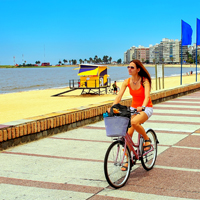Retire in Montevideo Guide
Summary: If Montevideo is on your retirement radar, our detailed Retire in Montevideo Guide is your go-to resource. Delve into the crucial aspects of life here, including living costs, climate, housing options, healthcare services, and residency procedures. We also explore the city's social dynamics, volunteering scenes, transportation, and how walkable its neighborhoods are.
Retiring in Montevideo is an increasingly popular choice for international retirees. The city offers a high quality of life, with a relaxed pace, a rich culture, and a welcoming community. The cost of living is affordable, the climate is pleasant, and the healthcare system is excellent. However, like any foreign country, there are challenges to consider, such as learning a new language and adapting to a different culture.
Affordability in Montevideo
One of the main attractions of Montevideo for retirees is its affordability. The cost of living is significantly lower than in many Western countries. Renting a comfortable apartment in a good neighborhood can cost as little as $500 a month. Groceries, utilities, and healthcare are also reasonably priced. However, imported goods and dining out can be more expensive.
Climate and Weather
Montevideo enjoys a temperate climate, with mild winters and warm summers. The city is located on the coast, which means there is often a refreshing sea breeze. The average temperature ranges from 12°C in winter to 28°C in summer. Rainfall is evenly distributed throughout the year, making Montevideo green and lush.
Healthcare Facilities
Uruguay has a high standard of healthcare, with many excellent hospitals and clinics in Montevideo. The city is home to the British Hospital, the American Hospital, and the Hospital de Clinicas, which are all well-regarded. Many doctors speak English and are trained to international standards.
Public Healthcare System
Uruguay has a public healthcare system that is accessible to all residents, including international retirees. However, many expats choose to take out private health insurance for more comprehensive coverage. The cost of private insurance is relatively low compared to the US and Europe.
Residency Options
Uruguay offers several residency options for retirees. The most common is the rentista visa, which requires proof of a steady income from a pension or investments. The process is straightforward and can be completed in a few months.
Recreational Activities and Parks
Montevideo is a city of parks and plazas, with plenty of green spaces for walking, cycling, and picnicking. The Rambla, a 22-kilometer promenade along the coastline, is a favorite spot for locals and expats alike. The city also has several golf courses, tennis clubs, and gyms.
Local Cuisine and Restaurants
Uruguayan cuisine is a highlight of living in Montevideo. The city has a wide range of restaurants, from traditional parrillas (steakhouses) like El Palenque and La Otra, to international cuisine at La Perdiz and Tandory. For a casual meal, try a chivito (steak sandwich) at Bar Arocena or a pizza at Bar Tasende.
Language Learning Opportunities
While many Uruguayans speak English, learning Spanish can enhance your experience in Montevideo. The Academia Uruguay and the Spanish Uruguay School offer intensive Spanish courses for all levels.
Local Culture and Community
Uruguayans are known for their friendliness and hospitality. They are welcoming to foreigners and are always ready to help. Montevideo has a vibrant cultural scene, with numerous theaters, galleries, and music festivals. The city also has a weekly market, the Feria de Tristan Narvaja, where you can buy everything from fresh produce to antiques.
Meeting People and Volunteering
There are many ways to meet people in Montevideo, from joining a local club to volunteering. The South American Explorers Club and the International Women's Club of Montevideo are popular with expats. For volunteering opportunities, check out organizations like TECHO and Karumbé, which work with local communities and the environment.
Housing Options
Most retirees in Montevideo live in apartments, which are plentiful and affordable. The neighborhoods of Pocitos, Punta Carretas, and Carrasco are particularly popular for their safety, amenities, and proximity to the beach. Public transportation is efficient and inexpensive, so a car is not necessary.
About the Author
 Joshua Wood, LPC joined Expat Exchange in 2000 and serves as one of its Co-Presidents. He is also one of the Founders of Digital Nomad Exchange. Prior to Expat Exchange, Joshua worked for NBC Cable (MSNBC and CNBC
Primetime). Joshua has a BA from Syracuse and a Master's in Clinical and Counseling Psychology from Fairleigh Dickinson University. Mr. Wood is also a licensed counselor and psychotherapist.
Joshua Wood, LPC joined Expat Exchange in 2000 and serves as one of its Co-Presidents. He is also one of the Founders of Digital Nomad Exchange. Prior to Expat Exchange, Joshua worked for NBC Cable (MSNBC and CNBC
Primetime). Joshua has a BA from Syracuse and a Master's in Clinical and Counseling Psychology from Fairleigh Dickinson University. Mr. Wood is also a licensed counselor and psychotherapist.
Some of Joshua's articles include Pros and Cons of Living in Portugal, 10 Best Places to Live in Ireland and Pros and Cons of Living in Uruguay. Connect with Joshua on LinkedIn.
Additional Information:
- 7 Tips for Living in Montevideo
- Pros & Cons of Living in Montevideo
- Driving in Montevideo
- Health Care in Montevideo
- Discover the Best of Montevideo
- Cost of Living in Montevideo
- Healthcare & Health Insurance in Uruguay
- Best Places to Live in Uruguay
- Real Estate in Uruguay
- Do I need Health Insurance When Moving to Uruguay?
- Pros and Cons of Living in Uruguay 2025
- 2025 Guide to Moving to Uruguay




